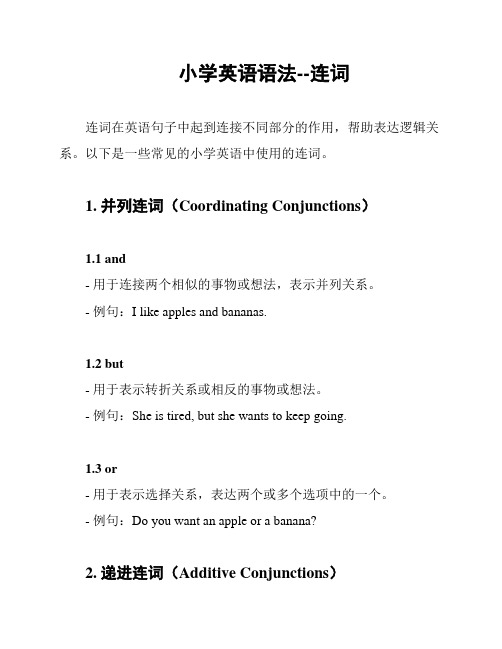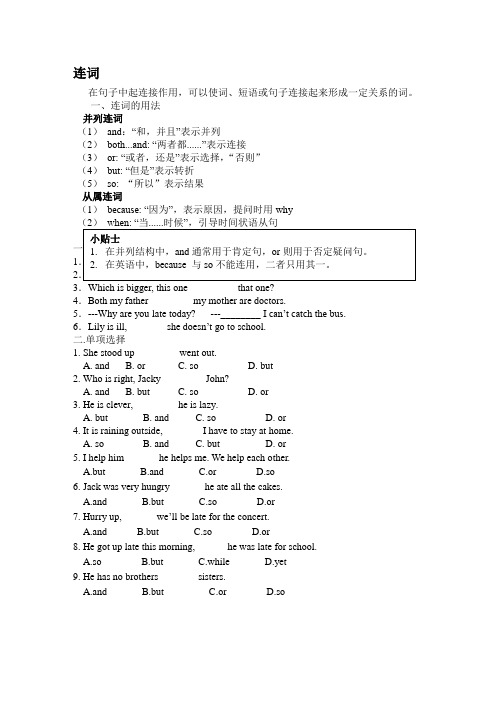2017年小学英语语法---并列连词
- 格式:docx
- 大小:15.95 KB
- 文档页数:4

英语中的连词和并列句的构建和使用连词在英语中起着连接句子、短语和词语的作用,使得语言表达更加流畅和连贯。
而并列句则是由两个或多个独立句子通过连词连接而成,使得句子之间的关系更加紧密。
本文将探讨英语中连词和并列句的构建和使用。
一、连词的分类连词可以分为并列连词、从属连词和关联连词三大类。
1. 并列连词并列连词用于连接并列的短语、词语或句子,常见的并列连词有and、but、or 等。
例如:- I like to play basketball and soccer.- She is smart but lazy.- You can choose either the red one or the blue one.2. 从属连词从属连词用于连接主从句,引导从属从句,常见的从属连词有that、if、when 等。
例如:- I know that he is coming.- If it rains, we will stay at home.- She will call you when she arrives.3. 关联连词关联连词用于连接两个或多个句子,使之在意义上联系紧密,常见的关联连词有however、therefore、moreover等。
例如:- He is a good student; however, he is always late for class.- She studied hard; therefore, she passed the exam.- The weather is nice; moreover, the scenery is beautiful.二、并列句的构建和使用并列句是由两个或多个独立句子通过连词连接而成的,使得句子之间的关系更加紧密。
并列句可以用于表达对比、选择、因果关系等。
以下是一些常见的并列句结构和使用方法。
1. 对比关系使用连词but、while、whereas等来表达对比关系。

小学英语语法--连词连词在英语句子中起到连接不同部分的作用,帮助表达逻辑关系。
以下是一些常见的小学英语中使用的连词。
1. 并列连词(Coordinating Conjunctions)1.1 and- 用于连接两个相似的事物或想法,表示并列关系。
- 例句:I like apples and bananas.1.2 but- 用于表示转折关系或相反的事物或想法。
- 例句:She is tired, but she wants to keep going.1.3 or- 用于表示选择关系,表达两个或多个选项中的一个。
- 例句:Do you want an apple or a banana?2. 递进连词(Additive Conjunctions)2.1 also- 用于添加类似的事物或想法。
- 例句:She speaks English, and she also speaks French.2.2 furthermore- 用于提供更多信息或进一步解释。
- 例句:He is good at math. Furthermore, he excels in science.3. 转折连词(Concessive Conjunctions)3.1 although- 用于表示尽管某个条件存在,但结果与之相反。
- 例句:Although it was raining, we still went outside.3.2 however- 用于表示对前面说法的转折或相反观点。
- 例句:I wanted to go to the concert; however, I couldn't find tickets.4. 原因连词(Causal Conjunctions)4.1 because- 用于表示原因或解释。
- 例句:He couldn't go to the party because he was sick.4.2 so- 用于表达前因后果的关系。

连词在句子中起连接作用,可以使词、短语或句子连接起来形成一定关系的词。
一、连词的用法并列连词(1)and:“和,并且”表示并列(2)both...and: “两者都......”表示连接(3)or: “或者,还是”表示选择,“否则”(4)but: “但是”表示转折(5)so: “所以”表示结果从属连词(1)because: “因为”,表示原因,提问时用why123.Which is bigger, this one _________ that one?4.Both my father ________ my mother are doctors.5.---Why are you late today? ---________ I can’t catch the bus.6.Lily is ill, _______ she doesn’t go to school.二.单项选择1. She stood up ________ went out.A. andB. orC. soD. but2. Who is right, Jacky ________ John?A. andB. butC. soD. or3. He is clever, ________ he is lazy.A. butB. andC. soD. or4. It is raining outside, _______ I have to stay at home.A. soB. andC. butD. or5. I help him ______ he helps me. We help each other.A.butB.andC.orD.so6. Jack was very hungry ______ he ate all the cakes.A.andB.butC.soD.or7. Hurry up, ______ we’ll be late for the concert.A.andB.butC.soD.or8. He got up late this morning, ______he was late for school.A.soB.butC.whileD.yet9. He has no brothers _______ sisters.A.andB.butC.orD.so。

连词在句子中起连接作用,可以使词、短语或句子连接起来形成一定关系的词。
一、连词的用法并列连词(1)and:“和,并且”表示并列(2)both...and: “两者都......”表示连接(3)or: “或者,还是”表示选择,“否则”(4)but: “但是”表示转折(5)so: “所以”表示结果从属连词(1)because: “因为”,表示原因,提问时用why一.用适当的连词完成下列句子1.I help her ______ she helps me.2.You can watch it, _______ you can’t touch it.3.Which is bigger, this one _________ that one?4.Both my father ________ my mother are doctors.5.---Why are you late today? ---________ I can’t catch the bus.6.Lily is ill, _______ she doesn’t go to school.二.单项选择1. She stood up ________ went out.A. andB. orC. soD. but2. Who is right, Jacky ________ John?A. andB. butC. soD. or3. He is clever, ________ he is lazy.A. butB. andC. soD. or4. It is raining outside, _______ I have to stay at home.A. soB. andC. butD. or5. I help him ______ he helps me. We help each other.A.butB.andC.orD.so6. Jack was very hungry ______ he ate all the cakes.A.andB.butC.soD.or7. Hurry up, ______ we’ll be late for the concert.A.andB.butC.soD.or8. He got up late this morning, ______he was late for school.A.soB.butC.whileD.yet9. He has no brothers _______ sisters.A.andB.butC.orD.so1。

并列连词英语词汇大全并列连词是英语语法中常用的一类连词,用于连接两个具有相同语法地位的词、短语或句子,使它们在句子中并列并表示相同或相关的意义关系。
在英语中有许多不同的并列连词,它们各自有着不同的用法和功能。
下面是并列连词的英语词汇大全,以帮助您更好地理解并使用它们。
1. And(和)"And"是最常见的并列连词,用于连接同等地位的词、词组、句子或段落,表示并列、增加或补充关系。
例如:- I like to read books and watch movies.- He is tall, handsome, and intelligent.2. Or(或者)"Or"用于表示选择、替代或否定的关系,可连接两个相互排斥的选项或叙述。
例如:- Would you like tea or coffee?- You can choose to study abroad or work in your hometown.3. But(但是)"But"表示对比、转折或限制的关系,连接两个相互对立的观点或观点的转变。
例如:- She is intelligent, but sometimes lazy.- We worked hard, but we failed the exam.4. Yet(然而)"Yet"与"but"的意思相似,用于表示转折或相反的关系。
例如:- She is very talented, yet she doesn't believe in herself.- It was a difficult journey, yet we reached our destination.5. For(因为)"For"用于表示原因或解释的关系,连接一个原因和结果。
例如:- He didn't study, for he was tired.- We went to the beach, for it was a sunny day.6. So(所以)"So"用于表示因果关系,连接一个原因和结果。

并列连词的用法一.概念连词是用来连接词,短语,句或句子的词.连词不作成分.二.相关知识点精讲1.表示并列关系的连词有:and和;both…and…两者都;not only… but also…不仅…而且;neither…nor…即不…也不;not…but…(不是…而是…) ;not…not…不…也不…(语气比neither…nor…弱)等。
如1)and:和,并且A:基本用法:“and”表示“和”、“并且”“而且”,“但”,表示动作的先后、因果、转折、强化语义等。
例如:I enjoy basketball , football and table tennis. 我喜欢打篮球、踢足球、打乒乓球。
Mary and Lucy like music very much. 玛丽和露茜喜欢音乐。
It’s getting colder and colder in winter.冬天气候变得越来越冷。
I like reading and my brother likes watching TV.我喜欢读书,而我弟弟喜欢看电视。
The weather becomes colder and colder. 天气越变越冷。
B:特别用法:祁使句后连接and,有条件句作用,此时and=if you…,you’ll…Go straight on, and you’ll see the library.==If you go straight on, you will see the library.一直走就能看到图书馆。
Be careful ,and you’ll make fewer mistakes.小心点,你就会少犯错误。
2)bot h…and…既…也…,(两者)都…A、both…and…构成的词组作主语时,谓语动词用复数。
Both Jim and Kate are from England.吉姆和凯特都是英国人。
B、both…and…否定句表示部分否定。
小学英语语法教案:连词【知识点讲解】1. 并列连词用来连接有并列关系的词.短语或分句的连词。
见的并列连词有:1). 表并列关系的and, both…and, not only…but also, neither…nor等。
and和, 并且; 这样的话,就会……例:He’s big and tall. 他很高大。
My uncle lives and works in Shanghai. 我叔叔在上海居住和工作。
Study hard, and you can get good grades.努力学习, 这样的话, 你就会取得高分。
(If you study hard, you can get good grades.)both …and既……又……例:The boy is both tall and fat. 那个男孩又高又胖。
Both New York and London have traffic problems. 纽约和伦敦都存在交通问题。
not only...but (also) 不但…而且…,不仅…还…例:My daughter can not only sing but also dance.我的女儿不仅能唱,还会跳。
Not only the students but also their teacher is enjoying the film.不仅学生们在欣赏这部影片,他们的老师也在欣赏这部影片。
(注意:谓语动词单复数采用就近原则)neither...nor, 既不…也不…例:She likes neither butter nor cheese. 她既不喜欢黄油也不喜欢乳酪。
Neither Jim nor Jack was at home. 吉姆和杰克都不在家。
(注意:谓语动词单复数采用就近原则)2). 表选择关系的or, either…or…等。
or 或(疑问句中);或(否定句中);否则例:Are you a teacher or a student? 你是老师还是学生?You can take some food or some money.你可以带点吃的或带点钱。
并列连词用法归纳并列连词用法归纳并列连词有and, but, or, for, nor, so, when, yet以及not only…but also…, both…and…, neither…nor…, either…or…, as well as/as well/as well…as等。
并列连词是构成英语并列句的桥梁,英语中两个或两个以上的互不依从的对等句子通常都是通过并列连词来体现的。
现分类如下:I.表示增补关系:这类并列连词通常是and、nor、so、both…and…、not only…but also…、neither…nor…、as well as…等。
1. and可用来连接两个或两个以上的单词、短语或句子,表示一种顺接的关系。
如:My brother and I study in the same school.Our knowledge may come from the books and from practice.We are singing and they are dancing.2. So表示肯定的增补,而neither、nor表示否定的增补,三者常位于句首,要求主谓倒装。
例如:Tom got up at six this morning. So did Mike. 汤姆今晨六点钟起床,迈克也是。
He can’t swim, neither can Mary. 他不能游泳,玛丽也是。
3. both…and…可用来连接两个并列的主语、谓语、宾语、表语和状语等。
当连接两个并列的主语时谓语动词通常用复数形式。
如:Both Li Ping and Mary are going to the Great Wall tomorrow.He can both swim and skate.They speak both English and French.4. not only…but also…、neither…nor…这两个并列连词和both…and…的共同特征是都连接两个相同的句法单位,如主语、谓语、宾语、表语和状语等。
并列连词的分类连词是用来连接词、短语、句子或句子成分的词语,以便形成复合句或复合句子。
并列连词是一种特殊类型的连词,用于连接同等重要的、平行的词、短语、句子或句子成分。
在英语中,有多种并列连词可供选择,并且它们可以根据其功能和用法进行分类。
在本文中,我们将探讨并列连词的几种常见分类。
1. 单一连词(Coordinating Conjunctions)单一连词也称为基本连词,它们在连接词、短语、句子或句子成分时都是相等的。
以下是最常见的单一连词:- 并列关系:and(和)、or(或)、but(但是)、nor(也不)- 选择关系:either...or(要么...要么)、neither...nor(既不...也不)- 转折关系:yet(然而)、however(然而)、but(但是)、nevertheless(然而)- 原因关系:for(因为)、so(所以)例如:- 我喜欢吃水果,而我的哥哥喜欢吃蔬菜。
- 我既不想去游泳,也不想去跳舞。
2. 标点符号(Correlative Conjunctions)标点符号连接词是由连词和其他成分(如代词或副词)组成的连词短语。
它们在句子中起到同样的作用,但常常以对称的形式出现。
以下是一些常见的标点符号连接词:- 不仅...而且(not only...but also)- 虽然...但是(although...yet)- 既然...所以(since...therefore)- 无论...都(whether...or)例如:- 不仅他会唱歌,而且他还会跳舞。
3. 从属连词(Subordinating Conjunctions)从属连词用于连接主要句与从属从句,从属从句在句子中起到附属的作用。
以下是一些常见的从属连词:- 虽然(although)- 因为(because)- 如果(if)- 直到(until)- 除非(unless)例如:- 因为下雨,所以我们决定取消野餐计划。
并列连词
Mr. And:大家好!我是And,把英语句子翻译成汉语时大家经常看不见我的影子,可是在英语中却必不可少。
我的任务是把两个或两个以上的有并列关系、动作先后关系或者是有条件和结果关系的句子连接起来。
After lunch Aunt Huang came in and she looked worried. 午饭后黄阿姨进来了,她看起来很着急。
(表示并列关系) Mary brushed her teech and she went to bed.
玛丽刷完牙,然后上床睡觉。
(表示动作先后关系)
Use your head, and you'll find a good way. 动动脑筋,你就会找到好的方法。
(表示条件和结果)该句相当于If you use your head, you'll find a good way.
"祈使句,+and + 一般将来时的句子"这是一个固定句型,表示"如果做到了祈使句表示的事情,就会有后面句子表示的结果。
"如:Work hard, and you will pass the exam. 努力学习,你就会通过考试。
Miss But:Hello, everyone! 我是Miss But。
我的工作是把两个意思相反或相对的句子连接起来。
我的同事还有:yet (可是),while (而)等。
大家请看:
I heard a big noise and I looked out, but I didn't see anything.
我听到一声巨响,就往外看,但是我什么也没看见。
I'm poor, but I always enjoy myself. 我很穷,但是我总是
过得很开心。
My elder brother likes playing basketball while I like playing football. 我哥哥喜欢打篮球,而我喜欢踢足球。
我是Mr. So. "因此"、"所以"就是我的口头禅。
我能迅速地把
含有因果关系的两个简单句连接起来。
下面请看我的才艺表演。
This is our first lesson, so I don't know all your names.
这是我们的第一节课,因此并不是所有人的名字我都知道。
I am rich, so I can buy myself lots of nice things.
我很富裕,所以我能给自己买很多好东西。
我有一个好朋友Mr. For,他的性格与我很相似,他也喜欢寻根
究底,只不过他注重原因,我注重结果。
He shook his head, for he thought differently.
他摇头(表示否决),因为他有不同的见解。
我是Miss Or,我是一个和蔼可亲的人,一般情况下我不会强迫某人去做某一件事情,我可以让他(她)自己做出选择。
有时,我也会比较严厉,这时候我会用命令的语气说"做好某事,否则(要不然)就会……"。
让我给大家献个"丑"吧!
You may do it yourself, or you can ask someone to help you.
你可以自己做,你也可以请人来帮你。
Work hard, or you can't pass the exam.(= If you don't work hard,
you can't pass the exam.)努力学习,否则你就会考试不及格。
"祈使句,+ or + 一般将来时的句子"是一个固定句型,表示"如果不做到祈使句表示的事情,就会有后面句子表示的结果。
"
并列句的特点是:并列句必须由两个或两个以上的主语、谓语结构组成,并且它们之间互不依从,通常它们之间由并列连词连接,去掉连词后它们都可以独立成句。
如果一个主语有两个或两个以上的谓语动词;或者有两个或两个以上的主语,却只有一个谓语动词不是并列句。
例如:
He closed the window, put on his coat, opened the door and went out.
他关上窗户,穿上大衣,打开门出去了。
Jim , Tom and I are in the same class. 我和吉姆、汤姆在同一个班。
巩固练习:
1. Be careful, _________ you will fall off the tree.
a. so
b. or
c. but
d. and
2. Never give up, _____ you'll make it. a. and b. but c. or d. yet
3. Lucy and Lily are twins. Lucy likes playing basketball, _________ Lily doesn't. a. and b. as c. but d. or
4. Mr Brown knows little Japanese, _________ he can't understand the instructions(用法说明)on the bottle of the pills.
a. so
b. or
c. but
d. for
5. My uncle doesn't have much money, ______ he always enjoys himself.
a. but
b. so
c. and
d. or。